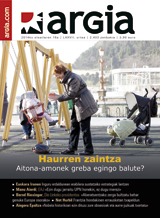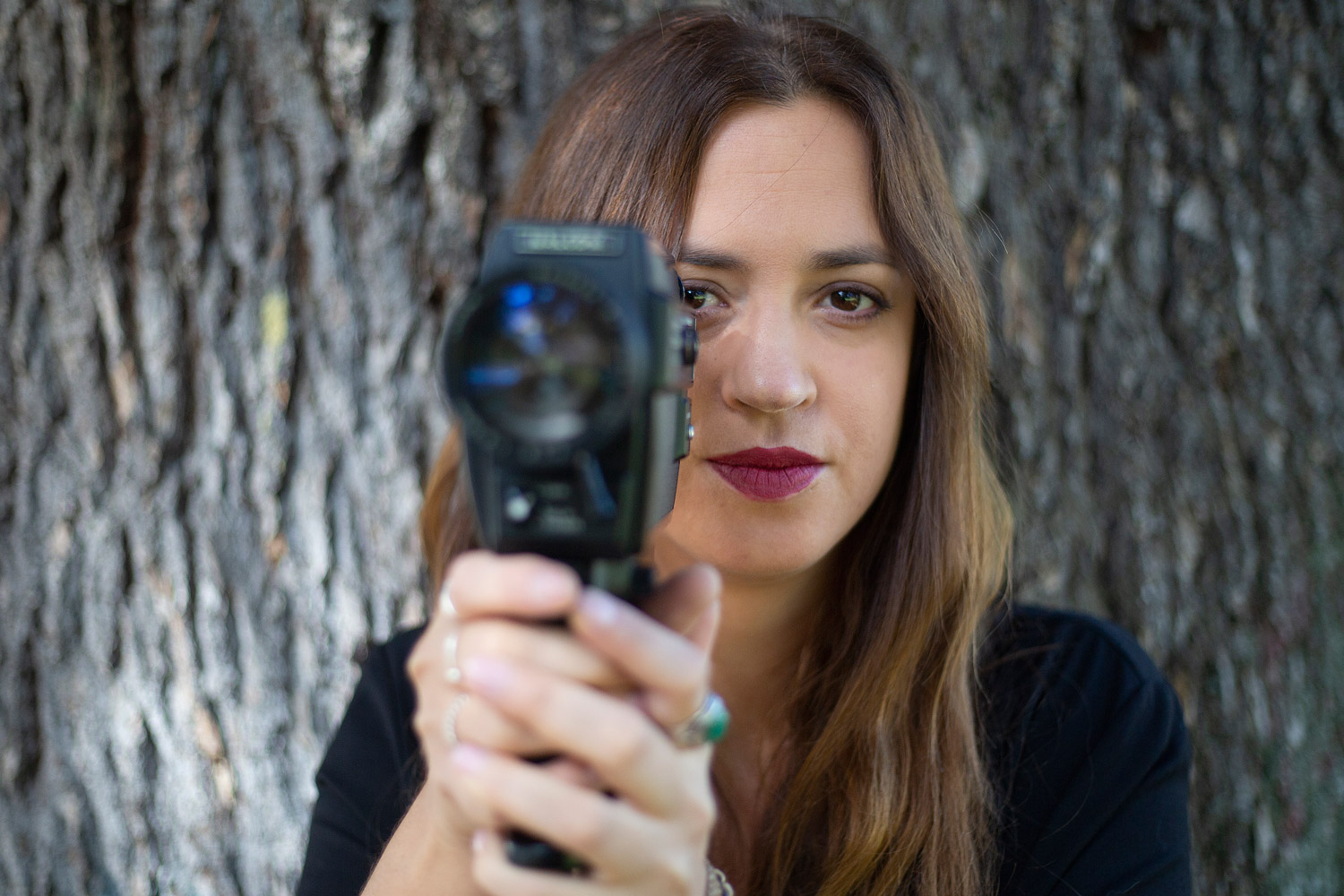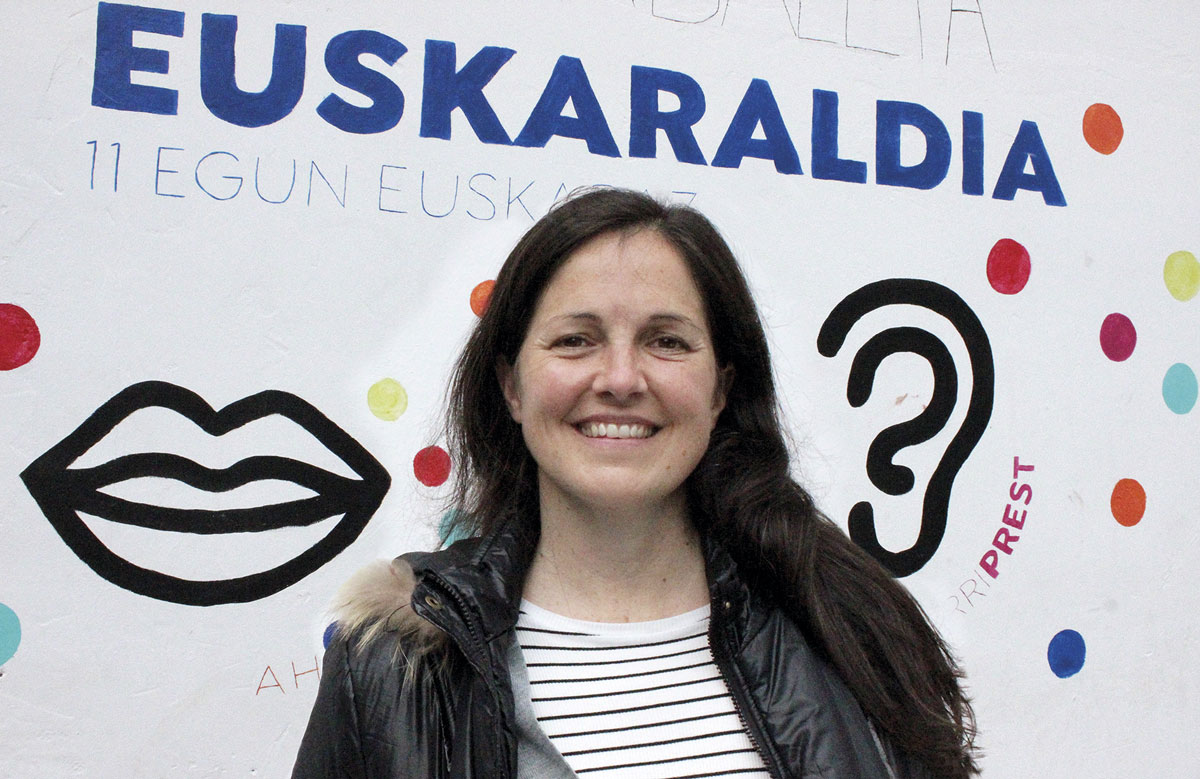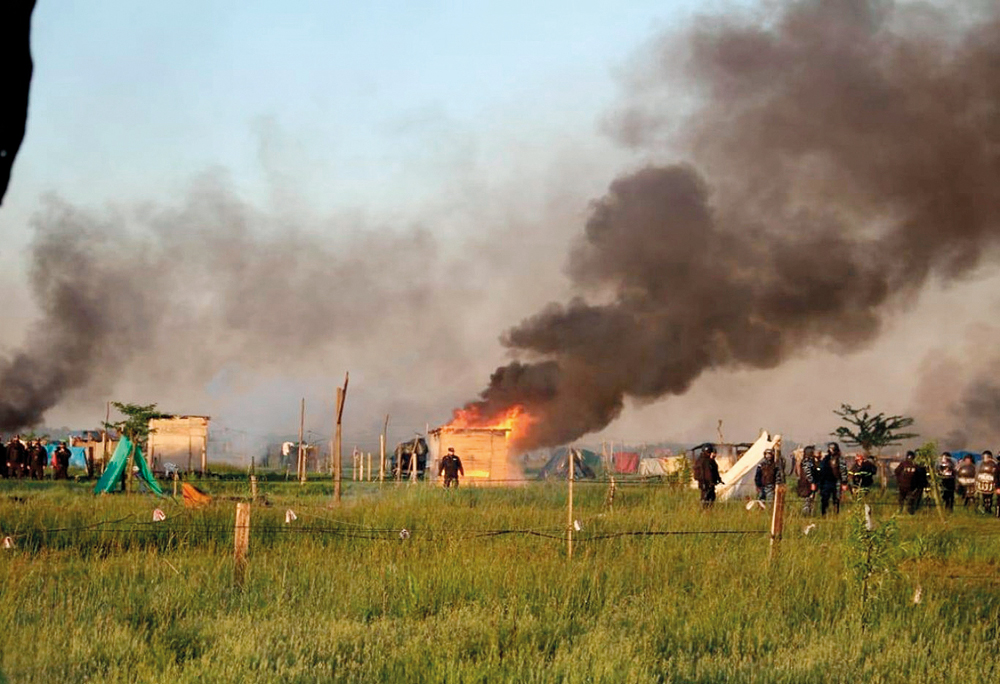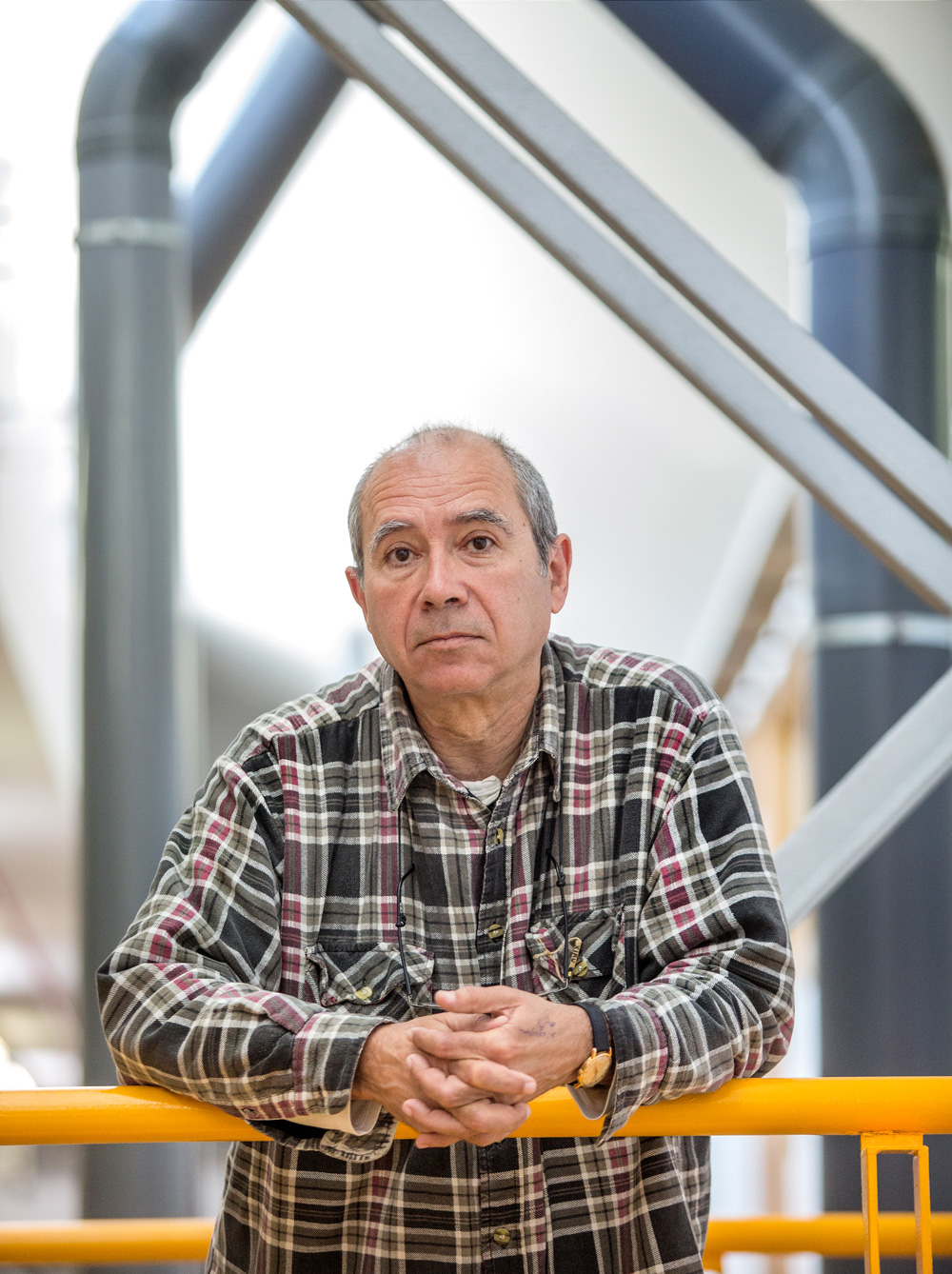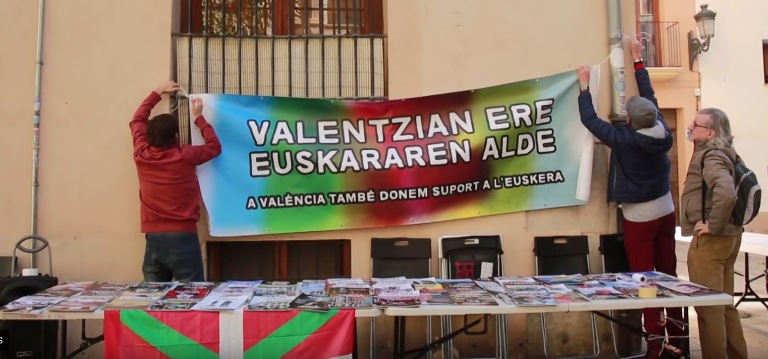"At the Haize Hegoa Basque Center in Montevideo, young people are always participating"
- Here is a young woman from Uruguay learning Basque in Lazkao, speaking in Basque, without any Basque origin. He liked the Basque with the taste of the Basque dances, and since then he studies and teaches in Montevideo.
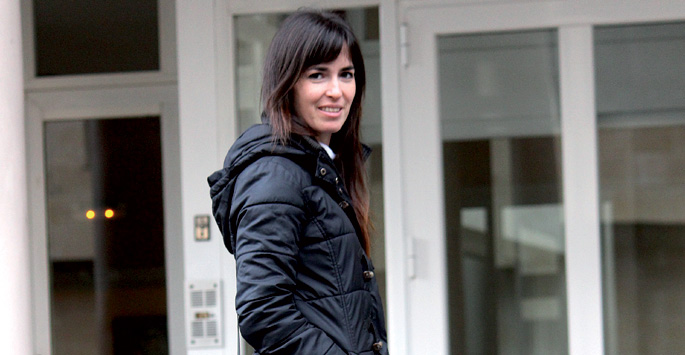
What are you doing, Uruguayan, in Lazkao, Maizorder?
Learning Basque. I'm taking the eighth step. First, I did the first level test, that is, the sixth step. But then I kept studying on my own, and here I am. I teach Euskera classes in Montevideo, in my etxea Basque, called Haize Hegoa. In fact, in Uruguay there are many Basque ethnic groups: In Montevideo, San José, Salton, Cologne… In Montevideo, for example, there are three. On the other hand, all the Basque centres are integrated into a federation, the FIVU, the Federation of Basque Institutions of Uruguay, where they all meet.
Basque student in Lazkao, professor in Montevideo and San José. You are not originally Euskaldun…
Bella is Italian and Garcia, Galician. My grandfather was Asturian. Their ancestors were Galician, from Ferrol. In 2007, I was also here, and I went to Asturias. But I've never been to Italy. I'm an Euskera student here, and a professor in Uruguay, but before Euskera, dance brought me to this town. In Haize Hegoa they held a festival in which we were invited to go, our mother and three sisters, Paola, Viviana and I. From the beginning I liked the Basque dances. They seemed very dynamic to me. I started studying. About fifteen years ago, I started studying dance, Basque dance, tango, for example.
Who was your teacher?
In the Basque centre Haize Hegoa, Maite Bengoa. She was born there, but her mother is Basque. Maite knows how to dance, and there she is a teacher. But not only did I start studying myself, but my mother and my two sisters also learned. It's also a group. It's called Eusko Indarra, and you have on Youtube the performance of our group's twenty-fifth anniversary. Two years ago, when she turned 30, we did another special performance in which my daughter also danced. She also likes it. Three generations danced: our mother, our daughters, and my daughter Micaela.
What dance did he learn?
The dance of Elciego, Axuri beltza, Zazpi jauzi, fandango and arin-arin… and many more. We learned to dance and taught it at the festivals organized by the Euskal Etxea. Other times, we do an exhibition, or we do it privately. They call us, they hire us and we go. Birthday, for example. Then, perhaps the largest meeting is that of Argentina, where Basque Week is held. I want to say that there are many or few performances, that every year we always have some dances.
The dance group Eusko Indarra de Zarautz, is 30 years old. And the Basque centers Haize Hegoa?
Exactly, about thirty. The other two houses in Montevideo are older: Basque Country and the Basque Country. They're also a hundred years old. Ours is new, open, do not set limits, do not have to be Basque, do not have to be Basque to be part of it. In the Basque Country etxea Euskaro, formerly known as the Spanish Basque Country, there was no such thing. Euskaro is also part of the FIVU and that is, for example, where I teach Euskera classes. I handed them over last year, and I hope to do so again this year. The dances are performed at the Casa Vasca Haize Hegoa.
How did he make the leap from dance to language?
My sister, Paola, jumped first. The Basque Country Etxea said that one could learn Basque: it was a summer barnetegi, in Argentina. I think it was two months. Her sister gave her name. He came back and started teaching. And he went on to study. So years later, he came to Lazkao in 2001, to Maizorder. He was there for six months and pulled out the EGA. Later, in 2008, he began a new course in Magisterium. It was the Ikasten Platform organized by the Basque Government: First was the “International Group” and then the “Euskara Munduan”. I started following my sister's footsteps. Our course took place between 2008 and 2012. Then we had to run the test in Argentina. I think it was the first time that this test was done there. They sent the tests here, corrected them and told me I had passed them. And the second year of this course.
In Montevideo and in San José, as you said…
Yes. I have four groups in Montevideo, two days, two hours, four hours a week. For me, it's sixteen hours in total. In San José I teach classes every Saturday, two and a half hours. I have an hour and a half walk between Montevideo and San José. It's close to us. Get up at seven o'clock in the morning, take the bus at eight o'clock, sleep in it, give class and go home at 12 o'clock. In Uruguay there are people who want to learn Basque. I, for example, have a group of eight students. Some have Basque surnames, others have another interest. Some find it a strange, difficult language… Sometimes they are retired, others are working… Among other things, I have grandparents. They don't have the pressure to learn, they have a hobby. But, yes, they like Euskera, that's for sure! Anyway, I'm showing you the first steps.
Are there Basque courses at the university?
Yes. Leonardo Egiazabal, Luzia Méndez and my sister Paola have been university teachers. All three have GABHS. Now just Leonardo is talking. The university there has an agreement with the government. In Argentina, for example. They teach language, they are not courses on Basque culture.
Why is it worth learning Basque in America?
I think the diaspora has a lot of strength. It is obvious. You just have to go to the Basque Week that is celebrated every year in Argentina, in the spring, in November. It's a big deal. Montevideo is not Argentina, it is small, there are not so many people there. But going to Basque Week is amazing. Last year it was in Villa María. This year will be in La Plata. We've been starting to go there for a long time with the dance group. Many years. With the Basque group we started about three years ago. Of course, money is the difficulty of going there. There are millions of people of Basque origin in Argentina.
You’ve known Basques in Uruguay, Argentina…
Also in Brazil. There they also organized Basque Week, and we went to Sao Paolo. When I did the Internet Basque course I met many people; Argentina, Chile, Colombia, Peru… Among other things, the Brazilians – Oskar and Karolina, my classmates – and they were invited to Brazil. I do not know if there are two Basque centres in Brazil. I know the Basque Country-Brazilian House. Within the course of the Internet, in summer we were doing a 15-day barnetegi, and in winter we were doing it for a week. We were going to Argentina, but once we went to Chile. The distances are very large, you have to take an airplane to get around. The government helps, the Basque centres too, and so we just have to learn. You have the opportunity to learn and be an Euskera professor. Then, your commitment is to teach Basque, to teach classes.
What would people say about Euskera in Uruguay?
People know about the Basques, yes. Many surnames are from here. The president, José Mujika, is also here. Last year he was in the Basque Country, and that trip was also well received in Uruguay.
In addition to a professor of Euskera, he is also a professor at a school in Montevideo.
I'm a lady. I work with 4-year-olds. It's a school from 3 to 5 years old. I work with these kids four hours a day. Four more hours out, teaching Basque in the Basque Country. Miss wins little. The truth is that the teacher has one of the lowest salaries in Uruguay. People here are weird to hear it, but that's how we live. So, with a job, alone, you can't live there. It must have at least two jobs. If you're a professor, at least. There are other jobs that pay better. And college teachers also don't think, they earn more than we do, but not much more: they have low salaries.
What is the social situation in Montevideo?
I don't like to walk down the street at night. In most neighborhoods, there are burglaries, and that scares me. Uruguay is not, however, Caracas. Otherwise, I would say that the Mujika Government has worked to reduce poverty. It has given them subsidies, it has increased social activity... I would say that the middle class is as it is, that it has imposed more taxes on the rich. Of course, some did not like that, but it seems to me that Mujika did well: to help the poor, to sustain the middle level…
This is not your first trip to the Basque Country.
No, the first time I came in 2001, and in 2007 I was also here, through the Basque Government’s Gaztemundu programme. On the first trip, I came to Korrika. In the second I met the Basque Country. It's the third time I've done it.
Was it the first time you went to Korrika?
Yes. Every now and then, the teachers here were going to Uruguay. Some of the AEK members also came to the site, and they made the plan to reach the Korrika. Finally, nobody came except me. By then, my sister Paola was already studying in Maizorder, and on the other hand, we had a friend from Uruguay in Algorta, another in Paris, in Barcelona… I did the circuit. However, I liked Korrika, the movement it creates. That year Korrika started in Vitoria, and there I was, and then I was in many small towns, looking. I studied the journey and I was going to see it.
In the second, Gaztemundu was the reason.
Yes. We did one week in Gaztemundu and another at the World Diaspora Congress in Bilbao, with the motto Zubigintza. To this end, we were presented with a subject – the participation of young people in the Basque centres that year – and we drafted a draft on this subject, making observations on participation.
Is youth participation a problem, perhaps low, or transmission?
At least, it's not among us. Haize Hegoa is a new Euskal etxea, and young people are always participating. We all carry out and organize activities: dance, Euskera, talks, colony... The main objective of the camp is to spread the Basque culture, and we are working on that. Geography, history, mythology…
This is your third trip.
Yes. When I came on the two previous trips I didn't know Euskera. Now I know something. The first professor and tutor was the director of Maizorder, Jon Urdangarin. I also had Dani Oiarbide, professor of Maizorder... There, during the week, we worked in Euskera and on Friday we sent what we have done to the teachers here. Most of the time it's individual work, but sometimes we meet with friends and practice together. The work we do there for a week we do here in one day! Moreover, we have a barnetegi, which is done twice a year, in Montevideo, Argentina or Chile. And there is always television in Basque on the internet, radio on the mobile…
Have you got to talk to in Montevideo?
Well, with my sister, with Martin Zabaltza and with Karina Fernández… and with some friends here for Skype and Whatsapp, and the last one for Mintzanet. For example, to speak in Basque, I've made a friend through Skype, called Anizeto. I know him on the screen, only on the Mintzanet program, and on this trip I will meet him first hand...
Andrea Bella Garcia (Montevideo, 1978). Italiarrak eta galiziarrak, erdibana ditu gurasoen jatorriak. Bera, berriz, euskaraz ikasten hasi zen noizbait, eta euskaraz ikasten eta irakasten ari da gaur egun. Montevideoko Haize Hegoa eta San Joseko Euskaldunak taldea euskal etxeetan euskara irakasle da, eta Haur Hezkuntzako irakasle Uruguaiko hiriburuko 316. haur eskolan. Hirugarren aldia egin du Euskal Herrian. Uda dute han, eta, oporretan delarik, bi astez izan dugu Maizpiden, euskara lantzen. Hirugarren astean lagunetan izan da, Gasteizen, Algortan eta adiskideak diren tokietan. Noticias Vascas izeneko atala du Facebooken.
“Montevideon, adinekoen artean ez dago euskaraz dakien jende asko. Maite Bengoaren ama dago, adibidez, Alejandra Telleria. 82 urte dituela uste dut. Beti kontatzen du ez ziola alabari euskaraz irakatsi bera gipuzkoarra delako eta senarra, aldiz, bizkaitarra zuelako. Batak pareta, besteak horma, eta ez zirela inoiz ados jartzen. Harekin hitz egiten dut euskaraz, ulertzen diot, behintzat. Ahizparekin zaila zait euskaraz hitz egitea. Email mezuak eta whatsappak euskaraz izaten ditugu, baina hitz egin, ezin. Pertsona batekin harremana hizkuntza batean sortzen duzunean, zaila da aldatzea, nire irakasle Jon Urdangarinen hitzetan”.
“11 urte ditu nire alabak. Ez dakit euskaraz ikasiko duen, baina dantza, seguru! Euskal etxean badugu pertsona bat, Karina [Fernandez], dantza eskolak ematen dituena. Hala ere, dantza baino lehen, euskara erakusten du. Udan berriz, udalekuak izaten ditugu eta han ere euskarari lotutako ekintzak izaten ditugu. Eta han da beti Micaela, ez du hutsik egiten”.
Euskal dantzak gustatu zitzaizkion eta euskarari lotu zitzaion. Gero, Euskal Herriko lurra bera. Laster, lagunak egin zituen, lagunartea osatu zuen. Rankinga erabakitzekotan, euskara du gauza guztien gainetik. “Euskara izan beharko litzateke lehenengo”, dio. Bestela izan litekeenik ere ez du ulertzen Andrea Bellak.
“Hemengo lagun bat ezagutu nuen Montevideon. Euskaraz sortu zen gure harremana. Gero, nire familiarekin eta lagunekin egon ginen, eta gaztelaniaz hitz egin behar izan genuen, eta oso arraroa izan zen haren ahotsa gaztelaniaz egiten entzutea, eta berari ere berdin gertatu zitzaion, oso arraroa egin zitzaion niri gaztelaniaz egiten ikustea. Gainera, gaztelaniaz egiten dudanean asko nabaritzen zait Uruguaiko azentua”.
Euskal jatorriko 37 gazte estatubatuar Euskal Herria ezagutzen eta euskara ikasten aritu dira uda hastapenean.
San Frantziskoko Euskal Etxeak 40 urte bete ditu asteburu huntan.
I have received an email from Brazil. These are words of beasaindarra Estebe Ormazabal Insausti, a subscriber of ARGIA. It's not the first person living abroad that we've brought to this corner. Little by little we are collecting the opinions, reflections, criticism and praise of... [+]
San Vicente barrutia (Argentina), 1934ko maiatzaren 18a. Mathilde Díaz Vélez lurjabeak Buenos Airesetik 40 kilometro ingurura zeuden bere lursailetan Guernica izeneko herria fundatzeko eskaera helarazi zion Buenos Aires probintziako Obra Publikoetako ministroari,... [+]









